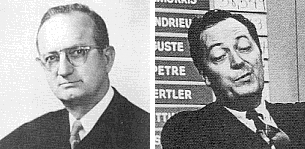Clay L. Shaw v. Jim Garrison
The Christenberry Decision

Judge Herbert Christenberry and Jim Garrison
A groundbreaking chapter of Patricia Lambert's False Witness examines the Clay L. Shaw v. Jim Garrison US District Court civil action of 1971, which prompted Judge Herbert J. Christenberry to dismiss the perjury charges that had been filed against Clay Shaw, for denying an association with Lee Harvey Oswald and David Ferrie.
"Questioned by William Wegmann for more than two hours, Garrison made statements that were glaringly erroneous. Others were self-serving. Most were both. To Wegmann's more sensitive questions Garrison stated he didn't recall, or he simply refused to answer, claiming privileged information under Louisiana's Public Records Act."(1)
Lambert points out some of Garrison's more interesting statements and non-statements:
Garrison said Shaw had been questioned three times before being arrested and only became a suspect after the second interrogation; Shaw had been questioned twice by Garrison's office,(2) and had been a suspect almost since Garrison's investigation began.
Garrison claimed he had been against using witness Charles Spiesel; everyone else remembered Garrison being the one who made the decision to use Spiesel.(3)
Garrison claimed that David Ferrie was still alive at the time of Shaw's arrest; Ferrie died on February 22, 1967; it was Ferrie's death that brought forth witness Perry Russo, who had been Garrison's sole justification in arresting Shaw on March 1, 1967.(4)
Garrison claimed that Ferrie was about to be indicted at the time of his death; there were no plans to arrest Ferrie at that time, as James Alcock confirmed.(5)
Garrison was asked how many witnesses against Shaw he had at the time of Shaw's arrest; Garrison refused to answer. (James Alcock testified that Russo was the only one.)(6)
Garrison was asked if he hadn't put Bundy on the stand knowing his story had undergone severe changes. Hadn't Garrison stated to a staff member, "We did not tell him to lie; put him on the stand," or words to that effect? Garrison refused to answer.(7)
Garrison was asked if anything came out of his investigation aside from the Shaw prosecution; Garrison said yes. Garrison was asked to elaborate; Garrison refused.(8)
Garrison was asked if a report had been made detailing his investigation. Garrison said that a "public report" would indeed be forthcoming "to the citizens of New Orleans." (It never arrived.)(9)
Garrison did have one witness to vouch for his credibility: Perry Raymond Russo. Except that Russo only cited his Fifth Amendment rights and refused to say a word on Garrison's behalf. Why? Because the previous evening Russo had confessed to Shaw's lawyers -- in a tape-recorded interview -- that Clay Shaw had "absolutely not" been in Dave Ferrie's apartment as he'd previously testified; Russo was terrified of being charged with perjury by Garrison, as Garrison had warned him repeatedly he would be if he ever changed his story about Shaw.(10)
Other interesting moments reported by Lambert:
Garrison saying he doubted the accuracy of polygraphs. (He used them frequently.)(11) Bill Gurvich describing how Garrison had ordered Walter Sheridan and Rick Townley arrested, handcuffed and beaten when Perry Russo accused them of attempted bribery (a fabricated charge to begin with, as demonstrated by statements from other reporters that Russo tried to coax into offering a bribe).(12)
Gurvich describing Garrison's 1967 plan of raiding the local FBI office with "red pepper guns" in order to find out if the FBI was bugging his office. (Assistant DA John Volz called this a Garrison "joke.")(13)
Attorney Hugh Exnicios describing how he secretly tape-recorded Garrison investigator Lynn Loisel as Loisel threatened and attempted to bribe Al Beaubouef into testifying falsely.(14)
Garrison trying to explain what had happened to the $99,488.97 he'd received from Truth and Consequences (mostly from Willard Robertson).(15)
Judge Christenberry concluded that Garrison never had any "factual basis for questioning Shaw about the assassination" in the first place, and noted that Garrison "resorted to the use of drugs and hypnosis on Russo, purportedly to 'corroborate' but more likely to concoct his story." He referred to Garrison's treatment of Shaw as "outrageous and inexcusable" -- "a case of continuing harassment and multiple prosecutions" with the likelihood that both would "continue in the future." Christenberry then granted the defense's request for a permanent injunction.(16)
Unfortunately, that injunction didn't apply to Garrison's literary endeavors.
Read Judge Christenberry's decision
1. Patricia Lambert, False Witness (New York: M. Evans and Company, 1999), p. 165.